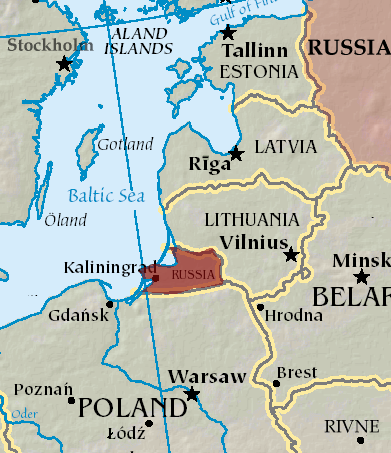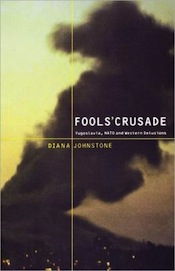mardi, 16 décembre 2014
Is Kaliningrad NATO’s Real Target?
Is Kaliningrad NATO’s Real Target?
 Rick Rozoff’s vitally informative site, Stop NATO, just forwarded a Stars and Stripes report on “NATO’s largest training exercise since the end of the Cold War”.
Rick Rozoff’s vitally informative site, Stop NATO, just forwarded a Stars and Stripes report on “NATO’s largest training exercise since the end of the Cold War”.
The forces that took part in the exercise, called “Trident Lance”, mostly came from the Joint Multinational Training Center in Grafenwöhr, Germany. Command elements from Poland, Greece and Turkey also took part, while U.S. Army in Europe provided a hefty logistical contribution, the Army newspaper said.
NATO land forces commander Lt. Gen. John Nicholson said that the exercise showed that NATO’s Allied Land Command (LANDCOM) has finally reached full operational capacity.
Ready to go!
To go where?
“One aim of the exercise, Trident Lance, was to test how well a fully operational LANDCOM — which is charged with improving the effectiveness and reaction time of the alliance’s land forces — could respond to an international crisis. In this case, the scenario dealt with the hypothetical invasion of NATO member Estonia,” Stars and Stripes reported.
Of course Russia is not going to “invade Estonia”, an absurd hypothesis. There is no conceivable evidence or reason for a “Russian invasion” of Estonia.
But examine a map of the Baltic. There, very discretely, lies Kaliningrad. A small enclave of half a million people belonging to Russia. It used to be Königsburg, a part of Germany, lost in the Second World War. Wedged between Poland and Lithuania, it is already hit by damage to its trade with the E.U. resulting from U.S.-imposed sanctions. The prospect of recuperating Kaliningrad/Königsberg through some manipulated incident could be a factor in the present official German anti-Russian position, which goes against German economic interests and about half of German public opinion.
A war to conquer Kaliningrad would be started by some contrived “international crisis” to “respond” to.
It would be sold as a natural response to Russia’s recuperation of Crimea. The comparison was already floated back in March by The Moscow Times.
But Crimea was recuperated without bloodshed, by a peaceful referendum of the citizens who voted overwhelmingly to return to Russia, their traditional homeland, at a time when the legitimate government of Ukraine had been overthrown in a vehemently anti-Russian coup.
A NATO operation would be quite different.
How it would end, I do not venture to guess.
Cassandra has her limits. And hopes she is wrong.
Diana Johnstone is the author of Fools’ Crusade: Yugoslavia, NATO, and Western Delusions. Her new book, Queen of Chaos: the Foreign Policy of Hillary Clinton, will be published by CounterPunch in 2015. She can be reached at diana.johnstone@wanadoo.fr
00:05 Publié dans Actualité, Affaires européennes, Géopolitique | Lien permanent | Commentaires (0) | Tags : politique internationale, géopolitique, europe, affaires européennes, mer baltique, espace baltique, russie, otan, atlantisme |  |
|  del.icio.us |
del.icio.us |  |
|  Digg |
Digg | ![]() Facebook
Facebook



Les commentaires sont fermés.